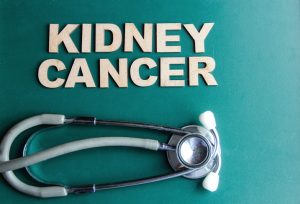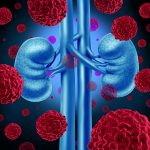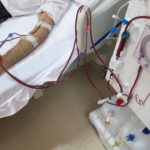 June 22nd is World Kidney Cancer Awareness day. This is a time where the global community of patients, caregivers, family, and medical professionals raise awareness for kidney cancer, a serious disease that affects hundreds of thousands of people around the world. To help familiarize yourself with the topic, we have provided articles on end stage renal disease and hepatorenal syndrome. We have also included information on low cholesterol and new information on a new drug that boosts the immune system, increasing kidney cancer survival.
June 22nd is World Kidney Cancer Awareness day. This is a time where the global community of patients, caregivers, family, and medical professionals raise awareness for kidney cancer, a serious disease that affects hundreds of thousands of people around the world. To help familiarize yourself with the topic, we have provided articles on end stage renal disease and hepatorenal syndrome. We have also included information on low cholesterol and new information on a new drug that boosts the immune system, increasing kidney cancer survival.
Low cholesterol may increase mortality risk in kidney cancer patients: Study
Low cholesterol may increase mortality risk in kidney cancer patients, according to research findings. The researchers analyzed the blood cholesterol levels in 867 patients with renal cell carcinoma prior to kidney surgery. The patients were then followed for a median of 52 months.
Advertisement
The researchers found that low blood cholesterol was associated with greater tumor growth and cancer spread during the follow-up period. Patients with high cholesterol were found to have a 43 percent lower risk of dying from kidney cancer, compared to those with low cholesterol levels.
How cholesterol levels affect mortality in kidney cancer patients is unclear, but there may be certain components of cholesterol that impact tumor growth and spread. Continue reading…
 Meat consumption and high cooking temperatures increase kidney cancer risk
Meat consumption and high cooking temperatures increase kidney cancer risk
A diet of high meat consumption, specifically when cooked at high temperatures, is associated with an increased risk of kidney cancer due to high carcinogenic compounds, which occur more often from barbequing and pan-frying.
The findings come from researchers at the University of Texas, who also found that those with a specific genetic mutation have a higher risk of the negative effects of carcinogens.
The most common form of kidney cancer is renal cell carcinoma (RCC), and it is estimated to affect 60,000 new patients this year and take 14,000 lives. The Western diet is primarily to blame for incidences of renal cell carcinoma. One main aspect of the Western diet is a high consumption of meat, which has already been tied to many cancers. It has long been unknown why high meat consumption is linked with cancer rates. Continue reading…
 Immune system boosting drug Opdivo increases advanced kidney cancer survival
Immune system boosting drug Opdivo increases advanced kidney cancer survival
An immune system boosting drug, which is also used in the shrinking of tumors, now shows promise in treating advanced kidney cancer. The drug is called Opdivo and in testing, it performed better than other drugs in its ability to shrink tumors and boost patient survival.
Senior researcher Dr. Padmanee Sharma said the findings “are significant and clinically meaningful to patients and health care professionals alike.”
The research team compared the effects of Opdivo with another common drug called Afinitor. Eight hundred people with advanced kidney cancer received the treatment. Shrinkage of tumors was seen in all patients. Continue reading…
 Kidneys damaged by excess red meat intake
Kidneys damaged by excess red meat intake
A new study has found that kidney damage can result from eating high amounts of red meat. The Singapore study suggests that swapping at least one portion of red meat for another type of protein can drastically lower the risk of kidney failure.
The study mainly focused on pork intake and was associated with end-stage renal disease (kidney failure). The study found that the higher the consumption of red meat, the higher the risk of kidney failure.
One of the study authors Dr. Woon-Puay Koh said, “Our findings suggest that patients with chronic kidney disease or the general population worried about their kidney health can still maintain protein intake but consider switching to plant-based sources. However, if they still choose to eat meat, fish/shellfish and poultry are better alternatives to red meat.” Continue reading…
 End stage renal disease (ESRD) or stage 5 kidney disease: Causes, symptoms, and treatment
End stage renal disease (ESRD) or stage 5 kidney disease: Causes, symptoms, and treatment
End stage renal disease (ESRD) is the last stage of kidney disease (stage 5) in which the kidneys cannot function any longer and are unable to keep up with the daily needs of the body. At this stage, dialysis or a kidney transplant is necessary in order to treat the disease.
Advertisement
The role of the kidneys is to filter waste from blood and urine. In kidney disease, the kidney’s ability to do this becomes impaired. With each passing stage, kidney function progressively decreases, so waste cannot be expelled and builds up in the body.
Those with end stage renal disease have kidney function below 10 percent, meaning the kidneys are barely functioning or not functioning at all.
Kidney function is measured by glomerular filtration rate (GFR). In stage 5, the kidneys’ GFR is less than 15. To compare, healthy GFR is above 90. Continue reading…
